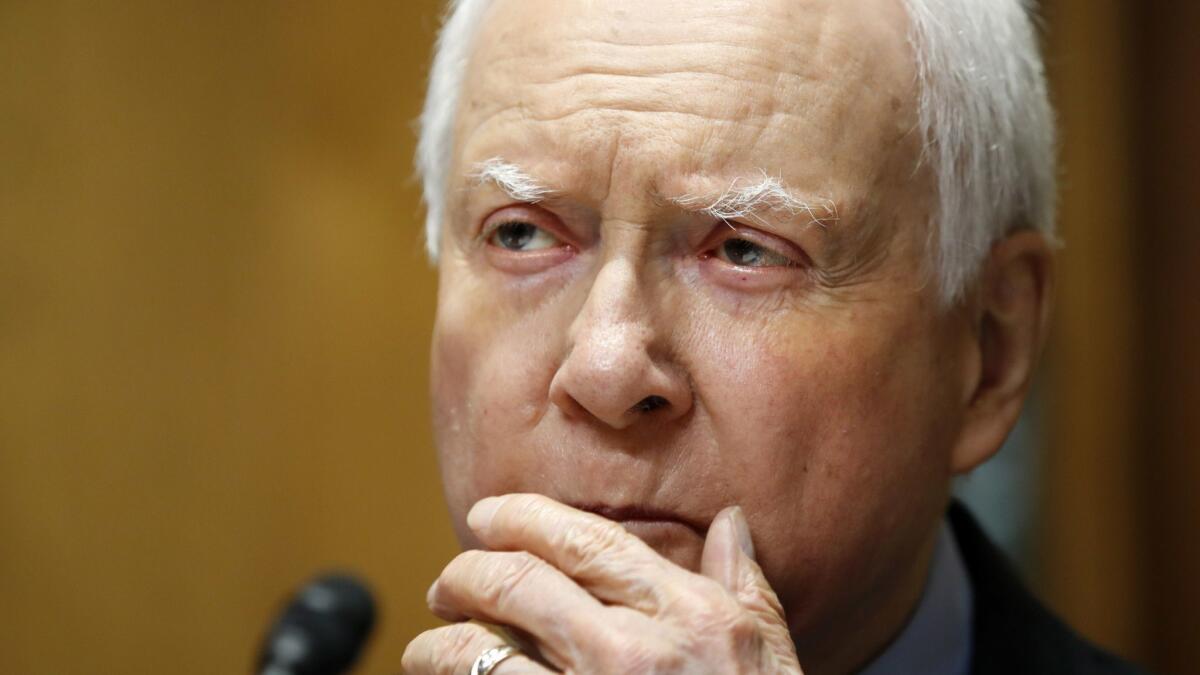Republicans and Commerce secretary square off in heated hearing over tariffs

- Share via
Reporting from WASHINGTON — Commerce Secretary Wilbur Ross defended the Trump administration’s tariffs on imported steel and aluminum before Congress on Wednesday amid withering, bipartisan criticism from senators who condemned the levies as unjustified and economically ruinous.
“Know that you are taxing American families, you are putting American jobs at risk, and you are destroying markets -- both foreign and domestic -- for American businesses of all types, sorts and sizes,” said Senate Finance Committee Chairman Orrin G. Hatch (R-Utah) at a committee hearing on the tariffs.
Ross countered, arguing “actions taken by the president are necessary to revive America’s essential steel and aluminum industries.” He added that “allowing imports to continue unchecked threatens to impair our national security.”
The tariffs of 25% on imported steel and 10% on imported aluminum -- levied on key U.S. allies including Canada and the European Union -- were initiated by the administration under a previously little-used provision of trade law that allows tariffs to be imposed on the basis of national security. The use of that provision gives the administration more leeway to make trade policy unilaterally.
They represented a culmination of the protectionist threats Trump campaigned on, but also the clearest dividing line between the president and a Republican Party that has traditionally embraced free trade.
Senators questioned the national security rationale of imposing high tariffs on friendly countries.
“I wish we would stop invoking national security, because that’s not what this is about,” said Sen. Patrick J. Toomey (R-Pa.). “This is about economic nationalism.”
Sen. John Thune (R-S.D.), a member of GOP leadership, told Ross: “This thing seems to be escalating out of control fairly quickly.”
Yet despite the GOP concerns, Republican senators recently declined to take what was likely their best chance to intervene, when GOP leaders blocked a vote on a bill by Toomey and Sen. Bob Corker (R-Tenn.) to give Congress veto power over tariffs invoked in the name of national security.
As of June 1, the 25% tariff applies to imported steel products from all countries except Argentina, Australia, Brazil and South Korea, according to a Finance Committee fact sheet. Imported steel products from Argentina, Brazil and South Korea are subject to quotas that prohibit any imports above the quota levels.
The 10% tariff applies to imported aluminum products from all countries except Argentina, Australia and Brazil.
In response, the targeted nations have announced a series of reciprocal tariffs and retaliatory steps of their own, which senators said are causing prices to rise for U.S. manufacturers and other businesses.
The administration’s tariffs against Mexico and Canada have been seen as an attempt to gain leverage as the administration renegotiates the North American Free Trade Agreement. That deal is widely supported by congressional Republicans, most of whom do not want Trump to follow through on his campaign-trail threats to withdraw from the pact.
Negotiations have sputtered, but Ross expressed optimism that they would pick up again after Mexican elections, and that the ultimate result would be an improved NAFTA. Some senators voiced skepticism about that as they questioned the administration’s tactics.
“What is it about the Canadian steel industry that is a national security threat?” Sen. Michael F. Bennet (D-Colo.) asked Ross.
Ross acknowledged that, in terms of dollar value, the U.S. actually has a trade surplus in steel with Canada. But he said the administration’s approach is necessary to engage other nations in putting up barriers to China’s practice of routing steel and aluminum through other countries to the United States.
“The only way we’re going to solve the global steel overcapacity . is getting all the countries to play ball with us,” Ross said. He contended that even as other countries are “complaining bitterly” they are also taking steps to put up barriers to China, which if taken earlier would have prevented the problems the administration is trying to address.
Ross also argued that some price volatility is due to what he termed “antisocial behavior by participants in the industry” who are engaging in speculative activity. He announced that the department was launching an investigation into such behavior to determine “whether there are people who are illegitimately profiteering.”
Trump has also escalated tariff threats against China, which Republican senators told Ross was resulting in dangerously rising prices in agriculture because of retaliation fears.
Several senators presented Ross with stories of businesses in their districts suffering from the tariffs, who have applied for exclusions offered by the administration to companies that cannot get steel or aluminum from other sources.
Sen. Claire McCaskill (D-Mo.) criticized the exclusion process as “chaotic and incompetent.”
Sen. Pat Roberts (R-Kan.) said, “These businesses are paying the price for the administration’s negotiating strategy.”
More to Read
Sign up for Essential California
The most important California stories and recommendations in your inbox every morning.
You may occasionally receive promotional content from the Los Angeles Times.













